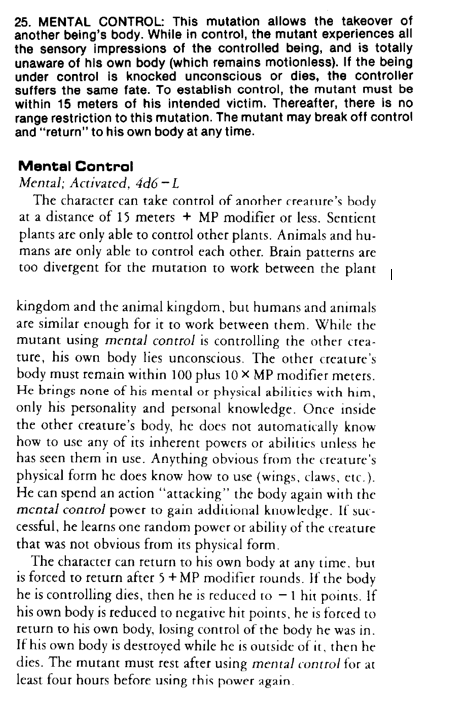Jumping between the 1E (1978) and 4E (1992) editions of Gamma World and the 1E (1979) and 2E (1982) editions of Villains and Vigilantes and you can see some interesting changes in the depiction of character powers - the earlier
Look at how much more detailed Mental Control is in 4th edition than it is in 1st, and so many of those are further limits on the power. Who it can and can't attack, how far away they can be, how long it lasts, what they can do with the controlled body, are all seriously diminished in 4E from 1E. But the concept of this being a dominance/possession where the PC can only control one body at a time and if the controlled body dies the controller also dies, are consistent.
Between 1978 and 1992 there are so many more RULES in place for how to handle this thorny power, but they are all still diegetic: you can go either way on whether you get to use the controlled body's muscle memory, but there's a logic to it; the rules don't get anything into the player experience of what happens to the player if their PC is under Mental Control, how to handle that at the table, the strength of the PCs will or the Players desires. 1992 didn't have the language for that.
As an aside, so many things in Gamma World feel, well, controlled. Like yes, you can be a mutated human, animal or plant, you can have any number of strange abilities, but Mental Control works like this no matter what, by god. It's strangely reminiscent of the Gumshoe game Mutant City Blues where the mutant powers are so consistent that they can be forensically tracked and used for crime solving (which is the whole premise of Mutant City Blues, a sort of CSI Super Heroes setting).
When you take a look at the two editions of V&V, separated by a much shorter period of time, it is both similar and different
It's hard to tell from the formatting of the two editions but the length looks roughly the same, with 2E being a little longer. But 2E is also more elegant. It has rules for fatigued elsewhere in the book it can reference rather than lay them out here (but they are the same concept of the controlled character being at half ability because of fighting against the control. Rather than a set deadline, the player has routine chances to escape the control based on their characters established personality; not great from today's design standards but also not as bad the the total lack of escape opportunity and rules for how the other characters in the scene can try to free the character. The power also becomes more rather than less open ended in its implementation: there's no discussion of whether the target remembers the mind control, it says that it may require communication, and doesn't discuss range once established. While the 1E power was open ended, the 2E is more so.
The power becoming more open ended and clearer makes it more comic book: here's the rough set of rules for how mind control works, but the specifics and chrome will change from character to character. Gamma World remains, for all it's crazy, a place where rules still apply, if you can learn them, and therefore manipulate them.
The V&V 1E to 2E is clearly a clean up edit. Gamma World 1E to 4E is laying down new rules and restrictions.
I don't normally refer to Mighty Protectors, which is the V&V 3E, because the system is just so different, but this is an interesting case
Please forgive the choppiness of the cut and paste there but I needed to skip the point cost table. But look at what the change between 1982 and 2017 produced. The mechanics and terminology are much more technical and precise. The absence of an attack/defense table in MP means a lot of rules around how to calculate a successful hit, with specific rules on if the attacker can tell the mind control worked: this would be depending on the specific character chrome in 1E/2E, but here is designed to set up the exact scene of pretending to be controlled even if that doesn't necessarily follow the character intent. Being able to silently control someone is a paid for ability rather than something determined as part of the character idea/ general power weighting. The mind control lasts even after the mind controller is knocked out, which again might or might not make sense and used to be up to the GM and Player to design for the character
Controlled targets get a chance to save every round, as well as when ordered to act against their nature or when allies try to help them; Mind Control as a way to remove player agency is just so much easier to escape. Except there's a save involved and the GM can say "Oh this villain spent eleventy-skillion imaginary points so your save penalty is enormous" so the chance to escape may be illusionary. Still, stochasticity says a 5% chance is gonna come up sooner or later.
All told the decisions around how the power works across the 5 examples are interesting to me in terms of time and design and GM/Player Design at Start agency. Likely more on these topics later.





No comments:
Post a Comment